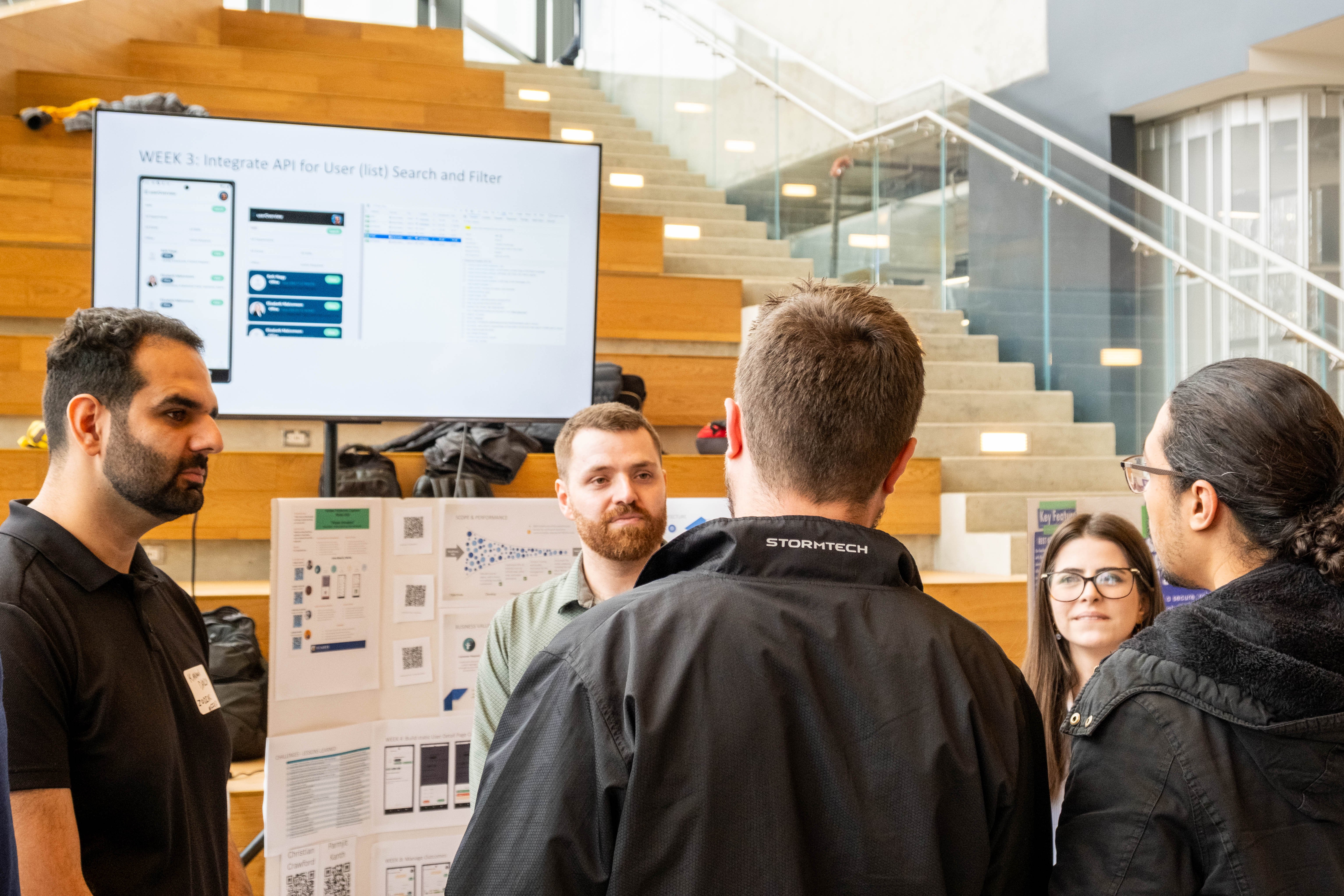ICT Capstone Expo bridges theory and practice

By Mar Greig
The Barrett Centre for Technology Innovation buzzed with activity as graduating students from Humber Polytechnic’s Information & Communication Technology programs prepared to present their final capstone projects to a packed audience of supporters, faculty and engaged industry representatives.
This year’s expo featured over 80 projects developed by graduates from multiple programs, including Cloud Computing, Artificial Intelligence with Machine Learning, Enterprise Software Development, and Information Technology Solutions.
The ICT Capstone Expo is more than a demonstration of final-year projects—it’s a testament to student dedication, faculty mentorship and the power of hands-on learning.
Learning Beyond the Classroom

One team, Polytechnic Innovators, consisting of Information Technology Services students Marina Carvalho, Christian Crawford, Kanwar Danish, and Parmjit Kanth, worked on updating an existing app using React Native.
They worked with industry sponsor Zodiac Group to modernize the app Meerby. Meerby functions as a modern-day call button, allowing retail customers to press a beacon on their phone or in-store that alerts employees that they need assistance.
Kanwar Danish spoke candidly about the challenges of mastering new technology, especially under pressure.
“Even for the most advanced developer or engineer working in the field for 20 years, learning a new technology always has its learning curve. I know it can get you anxious or overwhelmed but never feel like that’s going to hold you back,” he said.
For many students, these projects marked a first foray into practical application. Christian Crawford reflected on his experience of updating the in-store notification tool.
“I had zero background in coding two years ago, so getting into this app and this project was big. It felt great to get into it because I had done nothing like this,” said Crawford. “It’s very cool. We’re really proud of it.”
Faculty of Applied Sciences & Technology professor Robert Morrone, who supervised multiple capstone teams, emphasized the value of real-world relevance.
“They get to actually work on projects that industry sponsors are going to implement or have already implemented. Some work on features that are on existing products, and they get to look at what life would be like working for an organization,” said Morrone.
Hands-on Experience with Industry Applications
Artificial Intelligence (AI) with Machine Learning students Lucas De Almeida Fernandes, Jaspreet Kaur, Chandana Raju, Mohammad Sayeed M. Syed, and Frederico Villar worked on a capstone project with industry sponsor Kevares.
“Capstone projects play a significant role in student success by allowing learners to apply the knowledge and skills they’ve gained throughout their academic journey in a real-world or practical setting,” said Timothy Wong, professor and capstone lead in the Artificial Intelligence (AI) with Machine Learning program.

The project focused on object detection on sidewalks. Standard object detection models often miss small or partially hidden objects, limiting their effectiveness in real-world applications.
The team developed a modular, real-time perception system using three object detection models: RT-DETR, Mask R-CNN, and YOLOv11.
By working on the project, the team gained hands-on experience and skills necessary for AI, robotics, and autonomous systems careers, including model benchmarking, GPU/CPU optimization, dataset analysis, and system integration.
Foundations of the Showcase
The idea for the showcase was spearheaded by Dr. Jonathan Kim, the Associate Dean of Information & Communications Technology within the Faculty of Applied Sciences & Technology from 2018 to 2023.
“[Students] need to understand how their knowledge and skills can be applied in the real world,” Kim said.
“Through the capstone project, they can experience how that can be done in the real world because industry can give them feedback on how their project is going, and how their project can be applied in a real situation.”
Kim credits his staff and colleagues with making the idea a reality.
“I truly wanted to showcase what our students can do,” he said of the initiative, which began in 2019.
Since the inaugural ICT Capstone Expo, the scale of the event has steadily grown. In the first year, all the projects could fit on the first floor of the BCTI,
but now the expo has expanded to the fifth floor.
Looking Ahead
As the semester comes to a close, the ICT Capstone Expo stands as a powerful testament to Humber’s dedication to applied learning, industry collaboration, and student empowerment. The event showcases innovative student projects that bridge the gap between theory and practice—offering a glimpse into a future shaped by talent, technology, and tenacity.
Faculty mentors like Morrone and Wong play a vital role in guiding students through the challenges of their capstone journeys.
Wong encourages his students to pursue projects that spark their curiosity.
“Capstone projects can be both exciting and challenging,” he said. “We suggest students work on something of their interest, plan ahead, leverage and build on top of prior work, maintain communication with team members and sponsors.”
Morrone’s advice to students working on future capstone projects is urgent but straightforward.
“It’s 14 weeks of learning new technology and doing project management, on top of doing all of their other courses,” Morrone explains. “I tell them right at the beginning, ‘14 weeks go by pretty fast. You can’t waste a week.”
From creative concepts to real-world applications, the projects unveiled at the ICT Capstone Expo reflect not just academic achievement but the readiness of Humber students to step confidently into the careers they’ve worked so hard to prepare for.

